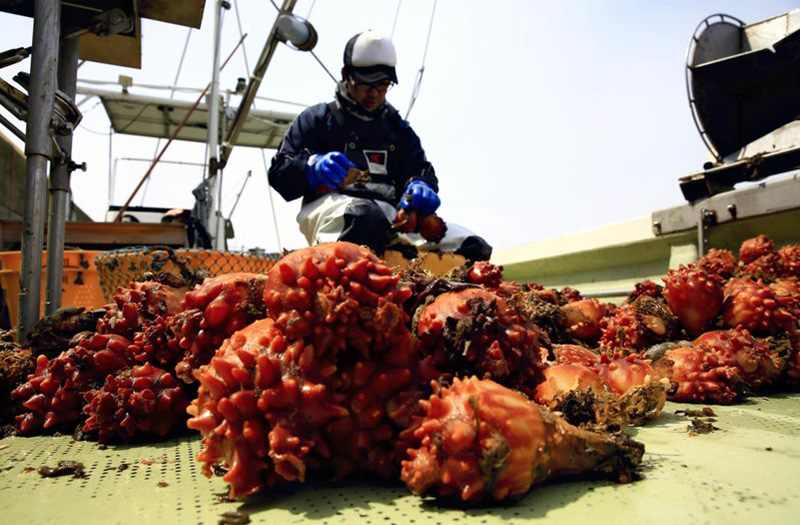
Ascidians are caught off Yagawahama in Ishinomaki, Miyagi Prefecture, in April 2019. Sales of the seafood are being affected by an import ban by South Korea.
14:58 JST, December 26, 2021
SEOUL — There were more than 200 incidents of Japan-caught fishery products being sold in South Korea without proper identification of their origin from January through November, The Yomiuri Shimbun has learned from South Korea’s Ministry of Oceans and Fisheries.
The total number of cases was 203, the highest such figure since the 2011 accident at the Fukushima No. 1 nuclear power plant, and 1.5 times the previous record of 137 registered for the whole year of 2019. Damage from groundless rumors related to Japan-caught marine products appears to be widespread under the administration of South Korean President Moon Jae-in.
The cases were identified by the National Fishery Products Quality Management Service, which is under the wing of the ministry.
The ministry has tightened its controls since the Japanese government decided in April on the planned discharge into the ocean of treated water from the Fukushima No. 1 nuclear power station of Tokyo Electric Power Company Holdings, Inc. This has led to greater exposure of cases involving marine products whose place of origin is not properly identified.
Since the nuclear accident that occurred at the Fukushima plant in the wake of the Great East Japan Earthquake, the South Korean government has continued to prohibit the import of marine products caught in eight prefectures of Japan, including Fukushima and Miyagi.
There is tendency in South Korea to avoid even Japanese fishery products caught outside those eight prefectures. This has led to the problem of sellers offering Japan-caught marine products without indicating they are from Japan, or claiming the products are from South Korea.
Harm from false rumors related to Japan’s fishery products seems to have spread further with the Japanese government’s decision to release treated radioactive water into the sea.
Experts at the International Atomic Energy Agency, and from the United States and South Korea, have judged that TEPCO’s planned release of the treated water is safe.
In a report released in April, the Korean Nuclear Society called on the South Korean government and the nation’s mass media to create appropriate policies and news reports concerning the discharge of treated water, based on scientific facts.
It also appealed to the public on the need for “civic awareness mature enough to determine truth from falsity amid a deluge of information.”
The South Korean government on Dec. 13 made clear its policy of applying to join the Comprehensive and Progressive Agreement for Trans-Pacific Partnership, an 11-member trade pact that includes Japan and Australia.
Seoul’s lifting of import restrictions on fishery products is expected to be one of the focal issues amid the procedures for joining. The South Korean government is also likely to be urged to take steps to deal with the harm from groundless rumors, by conveying information domestically based on scientific assessments.
Top Articles in World
-

Israeli Ambassador to Japan Speaks about Japan’s Role in the Reconstruction of Gaza
-

Videos Plagiarized, Reposted with False Subtitles Claiming ‘Ryukyu Belongs to China’; Anti-China False Information Also Posted in Japan
-

Chinese Embassy in Japan Reiterates Call for Chinese People to Refrain from Traveling to Japan; Call Comes in Wake of ¥400 Mil. Robbery
-

Russia: Visa Required for Visiting Graves in Northern Territories, Lifting of Sanctions Also Necessary
-

China, India Tapping into Promising African Market; Beijing Announces Tariff Cuts, Both Countries Aim to Expand Exports
JN ACCESS RANKING
-

Producer Behind Pop Group XG Arrested for Cocaine Possession
-

Japan PM Takaichi’s Cabinet Resigns en Masse
-

Japan Institute to Use Domestic Commercial Optical Lattice Clock to Set Japan Standard Time
-

Man Infected with Measles Reportedly Dined at Restaurant in Tokyo Station
-

Israeli Ambassador to Japan Speaks about Japan’s Role in the Reconstruction of Gaza






















